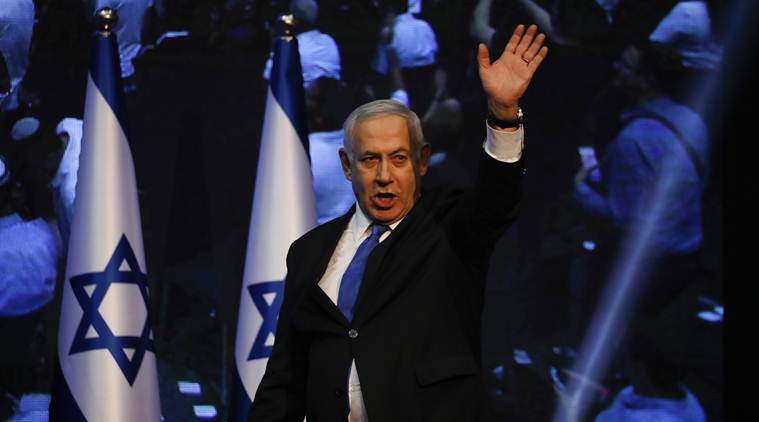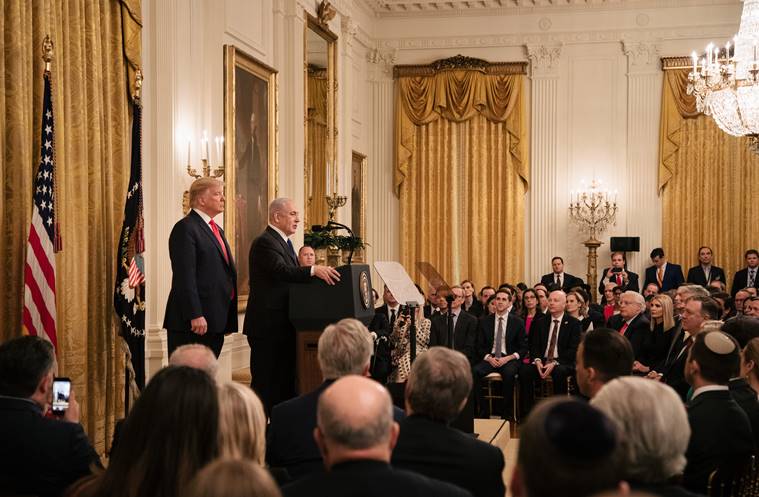 The Trump administration has urged Israeli PM Benjamin Netanyahu to delay any effective annexation of territory at least until after the March 2 elections. (AP Photo/Ariel Schalit)
The Trump administration has urged Israeli PM Benjamin Netanyahu to delay any effective annexation of territory at least until after the March 2 elections. (AP Photo/Ariel Schalit)
By Isabel Kershner
Shortly after last week’s rollout of the US’ contentious Middle East plan, Prime Minister Benjamin Netanyahu’s government made a triumphant promise that the Cabinet would vote this weekend to extend Israeli sovereignty over substantial parts of the occupied West Bank.
But it looks as if the Israelis misread the signals from Washington. The White House, while fully supportive of Netanyahu, was not ready to endorse an immediate unilateral annexation.
In the days following Tuesday’s unveiling of the plan in Washington, the Trump administration urged Netanyahu to delay any effective annexation of territory at least until after the March 2 Israeli elections. It was a request that one Israeli columnist likened to a birthday boy being told to wait to open his gift.
The question meant to be put to the Cabinet on Sunday was whether to extend Israeli sovereignty over all the Jewish settlements throughout the occupied West Bank as well as over a large, strategic swath of territory along the border with Jordan. The annexation was expected to be approved easily.
But the Cabinet did not meet and the vote never happened. Now the turnabout is proving embarrassing for Netanyahu so close to the election — and some of his fellow right-wing politicians fear it could cost them votes.
Israeli government officials were left to offer somewhat dubious explanations.
No Cabinet meeting or vote had actually been scheduled, they said, even though the same officials had issued a clear statement to that effect soon after the plan was announced. The only meeting Netanyahu convened with some of his ministers Sunday was to discuss national preparedness for the coronavirus outbreak.
Israeli officials are now saying it is not clear when the Cabinet will meet this week or whether any vote will take place.
“If he doesn’t bring any dividends on the ground — meaning annexation — it can boomerang,” Gayil Talshir, a political scientist at the Hebrew University of Jerusalem, said of Netanyahu.
She noted that the prime minister had already promised to annex West Bank territory before the last election, in September, which ended inconclusively, and that he has since been indicted in three corruption cases.
The new US plan did dramatically turn the preelection discourse away from Netanyahu’s recent indictment on charges of bribery and breach of trust, and back toward the security and diplomatic arenas, where he is far more comfortable.
 President Benjamin Netanyahu of Israel speaks while President Donald Trump looks on during a ceremony at the White House, Jan. 28, 2020. (Alyssa Schukar/The New York Times)
President Benjamin Netanyahu of Israel speaks while President Donald Trump looks on during a ceremony at the White House, Jan. 28, 2020. (Alyssa Schukar/The New York Times)
But Talshir said the prime minister still needed at least a “miniannexation” — of one major settlement, say — before the election. Otherwise, she said, some right-wing voters might prefer to stay at home or vote for parties further to the right than Netanyahu’s conservative Likud party. Or the focus could go back to Netanyahu’s legal troubles.
Ambiguities and contradictions arose immediately with the presentation of the Trump plan, which is heavily weighted toward Israel. It would allow Israel to annex about 30% of the West Bank, including all the parts it deems important for security or part of its biblical birthright.
In return, the plan makes the Palestinians a conditional offer of a truncated state made up of a disarmed Gaza Strip and chunks of the West Bank linked by roads and surrounded by Israeli territory. That would cast aside long-standing Palestinian hopes for an independent state that incorporated the vast majority of the West Bank and the Gaza Strip, with East Jerusalem as its capital.
Most of the world considers the settlements a violation of international law.
President Donald Trump first introduced the plan as “a basis for direct negotiations” between Israel and the Palestinians. But he also said the United States would recognize Israeli sovereignty over the parts of the West Bank it gets to keep under the plan, saying that could be “immediately achieved.”
Adding to the confusion, Trump said Americans and Israelis would form a committee to come up with a more detailed map, suggesting a process that might take some time.
Then came the dampener.
On Thursday, Trump’s son-in-law, Jared Kushner, who oversaw the creation of the plan, said in an interview with GZERO Media that “the hope” was that Israel would wait until after the March elections to annex territory. He said the technical work on the map could take a couple of months.
“We need an Israeli government in place to move forward,” Kushner said.
Israel’s last two elections, in April and September, ended in a close tie between Netanyahu’s political bloc and that of his main rival, and failed to produce a majority government. That led to the scheduling of an unprecedented third ballot within a year and no clear end to the political deadlock.
The delay in extending Israeli sovereignty to the occupied territories has exposed Netanyahu to scrutiny from some right-wing allies already leery of his embrace of a plan that includes a form of Palestinian statehood, however limited.
 Jared Kushner, a senior advisor to President Donald Trump, mingles before President Benjamin Netanyahu of Israel speaks at a ceremony at the White House, Jan. 28, 2020. (Alyssa Schukar/The New York Times)
Jared Kushner, a senior advisor to President Donald Trump, mingles before President Benjamin Netanyahu of Israel speaks at a ceremony at the White House, Jan. 28, 2020. (Alyssa Schukar/The New York Times)
“Let me be clear,” Naftali Bennett, Netanyahu’s defense minister and leader of the right-wing Yamina party, said on Twitter last week. “Whatever is delayed until after the elections will never happen” and “will remain outside for another 50 years.”
“If we postpone or reduce the scope of applying sovereignty,” Bennett said, “then the opportunity of the century will turn into the bungle of the century.”
On Sunday, Shai Alon, mayor of the settlement of Beit El, said, “We all celebrated the extension of sovereignty in the media, but we have not progressed 1 millimeter on the ground. There will be huge disappointment here if Netanyahu does not impose sovereignty by the election.”
There have been concerns in Israel and beyond about the repercussions of publicizing the plan, which the Palestinians angrily rejected. The Israeli military beefed up forces in the Jordan Valley, the rest of the West Bank and along the Gaza border. Jordan’s foreign minister warned of “dangerous consequences” of any Israeli annexation of Palestinian territory.
“Everything about this thing is confusing,” said Nasser al-Kidwa, chair of the Yasser Arafat Foundation and a nephew of the Palestinian leader, who died in 2004. “What is the exact timetable? What is going to happen when? Nothing is clear.
“The breaking point for everything,” he added, “will be if the Israelis proceed with any measures to annex or apply Israeli law or sovereignty to anywhere in the West Bank. Whatever the terminology, it amounts to the same thing.”
At a meeting of the Arab League foreign ministers in Cairo on Saturday, Arab states backed Palestinians’ rejection of the plan. In a speech, the president of the Palestinian Authority, Mahmoud Abbas, threatened to sever all ties with Israel and the United States, including in the security realm.
Nevertheless, the director of the CIA, Gina Haspel, was in the West Bank city of Ramallah on Thursday for meetings with Palestinian security officials.
Bennett, the Israeli defense minister, said Sunday that his country was stopping all agricultural imports from the Palestinian Authority to protest the authority’s limits in recent months on the import of calves from Israel.
Israeli authorities also halted cement shipments into Gaza and canceled 500 entry permits issued to Gazan vendors because of the resumption of rocket fire and the launching of incendiary balloons from the Palestinian territory into southern Israel.
For all the latest World News, download Indian Express App
"plan" - Google News
February 03, 2020 at 03:35AM
https://ift.tt/2OlTWlu
Israel Puts Brakes on West Bank Annexation Plan - The Indian Express
"plan" - Google News
https://ift.tt/2un5VYV
Shoes Man Tutorial
Pos News Update
Meme Update
Korean Entertainment News
Japan News Update
Bagikan Berita Ini














0 Response to "Israel Puts Brakes on West Bank Annexation Plan - The Indian Express"
Post a Comment